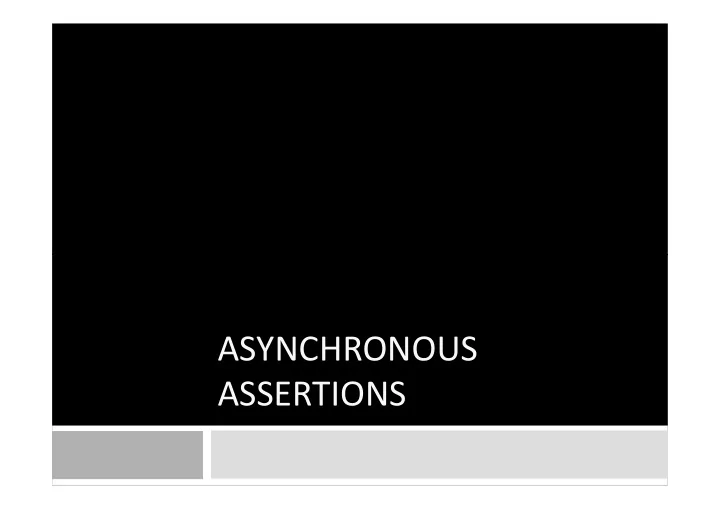

ASYNCHRONOUS ASSERTIONS
What are assertions? public class ATM { … public void withdraw(Account a, int amount) { int oldBalance = a.getBalance(); a.setBalance(oldBalance - amount); assert a.getBalance() < oldBalance; dispense(amount); } } Assertions allow programmers to verify that their program is in a certain status
What are assertions? public class ATM { … public void withdraw(Account a, int amount) { a.addTransaction(-amount, "ATM Withdrawal"); assert a.findTransaction(-amount, "ATM assert a.findTransaction(-amount, "ATM Withdrawal") != null; dispense(amount); } } What is the problem here?
What are assertions? � Assertions are used to verify your assumptions about the program � Evaluating assertions is expensive – especially if they rely on expensive calculations themselves they rely on expensive calculations themselves � Because of this, you may opt to remove them from your production code � This leads to some implications…
What are assertions NOT? public class ATM { … public void withdraw(Account a, int amount) { assert amount > 0; a.addTransaction(-amount, "ATM Withdrawal"); a.addTransaction(-amount, "ATM Withdrawal"); dispense(amount); } } Assertions cannot be used to verify user or method inputs
What are assertions NOT? public class ATM { … public void withdraw(Account a, int amount) { assert a.addTransaction(-amount, "ATM Withdrawal") == true; dispense(amount); } } Assertions cannot have side effects
Idea � If assertions are used only for debugging, we do not need the control flow to be halted while we evaluate the assertion � After all, we are sure that it is true anyway � After all, we are sure that it is true anyway � Why not do it asynchronously? � Problem: By then, object values have probably changed
Snapshotting � If we copy the stack and the heap at the time of the assertion, we can make sure we still have the correct data � That‘s expensive… � That‘s expensive… � Thus, only copy objects that are really modified � Copy-on-write
Snapshotting � Copy-on-write automatically guarantees isolation, preservance of identity, and consistent references � If many assertions are made, objects are copied � If many assertions are made, objects are copied more than necessary
Snapshotting � Every assertion defines ist own epoch � Instead of having only a „modified“ flag, objects are checked whether they were changed in a later epoch epoch � Only then they have to be copied
Snapshotting � Of course, if the epochs match, copies can be shared � Objects created after an assertion‘s epoch do not � Objects created after an assertion‘s epoch do not have to be copied
In case of an error… � The user can decide how to handle assertion errors: � Either the program terminates, throwing an AssertionError, or � The user can handle the situation by using a handle to the asynchronous evaluation
Discussion � „Handle into the future“ in violation of the JLS
Evaluation � Microbenchmarks: Simple data structures, synthetic benchmark: No significant improvement � JBB2000:
Evaluation � Asynchronous assertions reduce the overhead by approx. 90% � They scale good, at least as long as the checker threads are not overloaded: threads are not overloaded:
Discussion � Fallback to synchronous assertions if checkers are � Fallback to synchronous assertions if checkers are overloaded? � Profile assertions and execute simple ones synchronously?
Evaluation � Sharing copies helps:
Discussion � Are the benchmarks used really meaningful?
Reception � Only two theseses reference the paper � Not in the Jikes Research Archive � Not available in other VMs � Why? � Why?
Discussion � Questions? � Questions?
Discussion
Recommend
More recommend